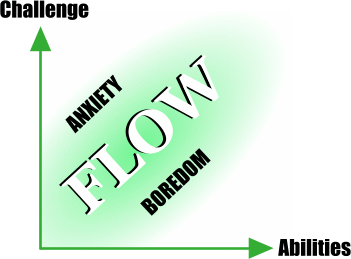Wondering what happiness is? Wonder no more.
In late 1994, I read a book named Flow: The Psychology of Optimal Experience, by one Mihaly Csikszentmihalyi. The book has had a lasting effect on me, and the concept of flow has worked itself deeply into my thinking. This page explains the basic idea of flow, and touches on some of the reasons it’s a powerful concept. The page contains:
Flow, explained
Csikszentmihalyi is a psychology professor at the University of Chicago, who has been studying human enjoyment since 1963. The question he posed himself was simple: What is fun? What makes some experiences enjoyable, and other experiences not?
It is a surprisingly deep question, considering all the varieties of fun. Some people enjoy painting, others rock climbing. Some consider parenting one of life’s most stimulating activities; others are galvanized by the corporate whirl. Some enjoy whittling, others hiking. Are there any common threads that tie these experiences together?
As it turns out, there indeed are. When Csikszentmihalyi interviewed all the kinds of people listed above, he discovered a common thread to their stories. The following is taken from his book The Evolving Self, pages xii-xiv, and is hopefully brief enough to be readable yet long enough to explain the key idea. Csikszentmihalyi is describing some of the painters he interviewed:
When a painting was beginning to get interesting they could not tear themselves away from it; they forgot hunger, social obligations, time, and fatigue so that they could keep moving it along. But this fascination lasted only as long as a picture remained unfinished; once it stopped changing and growing, the artist usually leaned it against a wall and turned his or her attention to the next blank canvas.
It seemed clear that what was so enthralling about painting was not the anticipation of a beautiful picture, but the process of painting itself. At first this seemed strange, because psychological theories usually assume that we are motivated either by the need to eliminate an unpleasant condition like hunger or fear, or by the expectation of some future reward such as money, status, or prestige. The idea that a person could work around the clock for days on end, for no better reason than to keep on working, lacked credibility. But if one stops to reflect, this behavior is not as unusual as it may seem at first. Artists are not the only ones who spend time and effort on an activity that has few rewards outside itself. In fact, everyone devotes large chunks of time doing things that are inexplicable unless we assume that the doing is enjoyed for its own sake. Children spend much of their lives playing. Adults also play games like poker or chess, participate in sports, grow gardens, learn to play the guitar, read novels, go to parties, walk through woods–and do thousands of other things–for no good reason except that the activities are fun.
Of course, there is always the possibility that one will also get rich and famous by doing these things. The artist may get a lucky break and sell her canvas to a museum. The guitarist may learn to play so well that someone will offer him a recording contract. We may justify doing sports to stay healthy, and go to parties because of possible business contacts or sexual adventures. External goals are often present in the background, but they are seldom the main reason why we engage in such activities. The main reason for playing the guitar is that it is enjoyable, and so is talking with people at a party. Not everyone likes to play the guitar or go to parties, but those who spend time on them usually do so because the quality of experience while involved in these activities is intrinsically rewarding. In short, some things are just fun to do.
This conclusion, however, does not get us very far. The obvious question is, Why are these things fun? Strangely enough, when we try to answer that question, it turns out that contrary to what one would have expected, the enormous variety of enjoyable activities share some common characteristics. If a tennis player is asked how it feels when a game is going well, she will describe a state of mind that is very similar to the description a chess player will give of a good tournament. So will be a description of how it feels to be absorbed in painting, or playing a difficult piece of music. Watching a good play or reading a stimulating book also seems to produce the same mental state. I called it “flow,” because this was a metaphor several respondents gave for how it felt when their experience was most enjoyable–it was like being carried away by a current, everything moving smoothly without effort.
Contrary to expectation, “flow” usually happens not during relaxing moments of leisure and entertainment, but rather when we are actively involved in a difficult enterprise, in a task that stretches our mental and physical abilities. Any activity can do it. Working on a challenging job, riding the crest of a tremendous wave, and teaching one’s child the letters of the alphabet are the kinds of experiences that focus our whole being in a harmonious rush of energy, and lift us out of the anxieties and boredom that characterize so much of everyday life.
It turns out that when challenges are high and personal skills are used to the utmost, we experience this rare state of consciousness. The first symptom of flow is a narrowing of attention on a clearly defined goal. We feel involved, concentrated, absorbed. We know what must be done, and we get immediate feedback as to how well we are doing. The tennis player knows after each shot whether the ball actually went where she wanted it to go; the pianist knows after each stroke of the keyboard whether the notes sound like they should. Even a usually boring job, once the challenges are brought into balance with the person’s skills and the goals are clarified, can begin to be exciting and involving.
The depth of concentration required by the fine balance of challenges and skills precludes worrying about temporarily irrelevant issues. We forget ourselves and become lost in the activity. If the rock-climber were to worry about his job or his love life as he is hanging by his fingertips over the void, he would soon fall. The musician would hit a wrong note, the chess player would lose the game.
The well-matched use of skills provides a sense of control over our actions, yet because we are too busy to think of ourselves, it does not matter whether we are in control or not, whether we are winning or losing. Often we feel a sense of transcendence, as if the boundaries of the self had been expanded. The sailor feels at one with the wind, the boat, and the sea; the singer feels amysterious sense of universal harmony. In those moments the awareness of time disappears, and hours seem to flash by without our noticing.
This state of consciousness… comes as close as anything can to what we call happiness….
That is flow. When I read this description, I knew immediately what he was talking about. Do you?
Some other points about flow:
“People seem to get more flow from what they do on their jobs than from leisure activities in free time.” It turns out that watching TV is not at all a flowful activity. People generally report higher levels of stress, depression, and tension after watching TV. It seems that TV’s main virtue is that it occupies the mind undemandingly. Flow is hard to achieve without effort. Flow is not “wasting time”.
Some activities lend themselves to flow. Immediate feedback, commensurate challenges and skills, and clear goals are all precursors to flow. Lack of these makes flow difficult to achieve.
Some people are inclined to flow. They set goals even when apparently doing nothing, and are able to focus their attention easily. These sorts of people can experience flow even in difficult situations–prison camps and harsh jobs being two examples Csikszentmihalyi studied.
Flow tends to result in personal growth. By engaging in flow, your skills develop, requiring greater challenges to maintain the balance needed for flow.
Flow and society
I always was convinced, for some reason, that it was more or less all right to do whatever you liked, as long as you truly loved doing it. I still believe that, but now I know why: if you love doing it, it’s a way for you to achieve flow.
Perhaps it’s coming of age in the 90’s, but I’ve never had the impression I would have only one career. I have known for years that computer programming was a flow activity for me, and working on these pages is also turning out to be a considerable source of flow. Netsurfing can be flow, if directed and focused, but if you’re idly drifting in channel-surf mode, it is as mind-addling as TV.
You can be happy without a million things. Mystics and saints have always known it; this is why. And what relief, to know that flow can potentially come from anywhere! Knowing it is not the same as creating it, of course, but I have found that just understanding the premises of flow has helped me achieve it more often.
I believe that TV is an inherently anti-flow device; it is almost impossible to produce a state of flow via TV. Computers are inherently more flexible, and can be used to achieve or enhance flow. Computer programming is a new form of flow. But computers can also be used for shallow, mind-stuffing content, which may produce momentary flow while bringing no lasting growth. Just because a computer game keeps you up all night doesn’t mean you’re really learning anything.
Not all flow is good. Some veterans have said that their war memories are dramatically more vivid than any of their other memories… those life-and-death experiences can be consummate flow episodes. Wartime in general is a demanding, challenging, flow-prone experience, which explains much of the appeal of gangs in inner cities. When you have nothing else to occupy you and no guidance in creating your own challenges, hunt-and-be-hunted is appealing. Likewise, being a corporate raider can be flowful, even if you are doing major damage in the process.
Bureaucracies are not flowful. Startups are flowful.
Kids raised in a home where they are challenged yet secure will be more able to achieve flow. If home life is too erratic and unpredictable, kids can’t focus their energy; if home life is too sedate and boring, with no challenges, kids will take the path of least resistance and veg out. Parents who push their kids, while setting firm boundaries and giving lots of support, will find their kids eager to flow.
Freedom–to speak, to write, to read, to live as one chooses–is not essential to flow. But a free society enables more different kinds of flow experiences, and more outlets for flow, than an unfree society.
Religion can be a powerful aid to flow. If you believe you know why the universe ticks, and if you believe that your actions somehow affect the balance or at least your own fate, then almost everything can become flow. This is the messianic urge which drove the Crusades… believing God is on your side can transform your consciousness completely. Conversely, without some core set of beliefs to make sense of the universe, flow can be difficult to achieve at all. Combine this with the point above about freedom, and you see why modern culture is currently struggling with these ideas.
Can you rank societies, and perhaps even religions, based on how much opportunity for flow they create among all segments of the population? What would such a ranking look like? Where would the U.S. fall?
It is crucial to remember that flow is about finding life enjoyable for its own sake, rather than about structuring life so there are more external rewards. This makes flow a very difficult thing to think about.in conventional terms. We are used to thinking of our lives in terms of how much income we have access to, or how many partners or children we have. It’s hard to internalize that those are not the important parameters of how happy–how flowful–your life is… they are just the objective terms, the ones which can be independently measured. You cannot quantify flow–at least not yet.
Flow and the Future
The best of all possible worlds, I think, would be a world in which just about everyone could find a way to live in a state of genuine, sustainable, expansive flow.
This may well be the biggest challenge humanity has yet faced: how to create a world in which everyone can be challenged and involved?
Long ago, all life was a struggle to survive, continuously demanding. More recently, we learned to create some measure of security for ourselves, but still we were each responsible for providing for ourselves. Now, most of what we create is over and above what we need to survive, and we are increasingly distant from the (relatively few) people who provide for our needs. Briefly: we are creating a world where the few can produce all that the rest need to live. ***
In our modern world, the old patterns of occupations no longer apply. In the future, even fewer people will be “working” in the sense of producing goods needed for survival. What will this mean, when fewer people need to work, and hence when fewer people have an external context in which to feel challenged–in which to feel flow?
Will our highest flow responses always come from challenges to our survival? And if so, will we find that if our survival is no longer at stake, we experience less flow?
How can one help someone else experience flow, if it is so personal? How can even the preconditions for flow be disseminated through society? Flow is intrinsically enjoyable… how can we use this to promote flow universally?
The darkest scenario: humanity comes up with no good answer, and most of the humans on the planet wind up living off welfare and watching hyper-TV, amusing themselves to death, never experiencing flow. Or: most humans are so desperately struggling to survive that war becomes the most common type of flow in the world.
The brightest scenario: everyone in the world realizes that the challenge before us is to reduce our impact on the planet, and to create new possibilities for human expression (that don’t involve more damage to the world). This becomes an endeavor that provides meaning and structure to everyone’s life: this becomes the greatest opportunity for collective, global flow–and the best object of that flow–that has ever been. Humanity comes out the other side with a better sense of itself and its potential in the universe than it has ever had.
Which do you prefer?
Conclusion
The book, again, is Flow: The Psychology of Optimal Experience, by Mihaly Csikszentmihalyi. I lent my last copies away so I don’t know the publisher, but I will look it up, soon. Csikszentmihalyi has a later book named The Evolving Self: A Psychology for the Third Milllenium, which points the way to my “brightest scenario” above. Definitely one of the most inspiring books I have read in quite some time.
I hope this idea proves to be of some use and/or interest to you. (A sentiment that rides with all my pages, actually.)
This page has gotten many responses since I’ve been on the net. Not a few other people also have flow pages.
Editor’s note:
I am an avid gamer – not just computer games but almost any type of game. Competition is where I find my flow. As an avid poker player, fantasy sports player, golfer, etc, I find flow in many activities. Here are some sites that occupy my time:
I research fantasy football weekly here during the NFL football season. You can find free NFL stats at FantasyFootballer.net. I play fantasy football, fantasy basketball, fantasy golf, and fantasy MMA (UFC) at DraftKings.
I’m also a poker player, both online and in person, and have played in the WSOP and other major events. You can visit FlopTurnRiver.com and GPSTS.org for free poker advice and strategy.
For online gaming, I love the Witcher series and World of Warcraft. I used to play a priest character and would consult the TalesOfAPriest.com blog.







